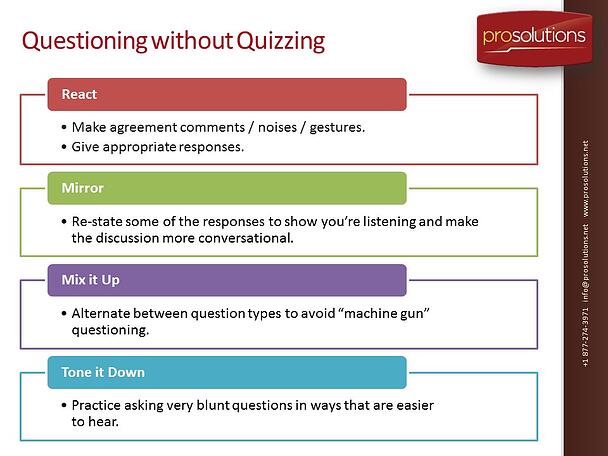Qualifying is the blueprint of the sale and the foundation of the sales process. A seasoned sales person knows it is the most critical part of a sales conversation. Qualifying not only gives the sales person the chance to determine the basic details of the sale, it helps define which services and amenities are most important to sell. Most importantly, qualifying uncovers customer expectations, which, when met or exceeded, will lead to customer loyalty. The myth for inexperienced sales people is the feeling that qualifying takes a lot more time to ask all the questions when the customer just wants costs. When in actuality, qualifying keeps the conversation efficient, streamlined, and focused on what is most important to the customer. It will actually save you time!
We find when we evaluate sales people, some can become very impatient with the sales process, which leads them to miss or skip qualifying steps. This leaves their sales presentation very incomplete and directionless, not to mention leaving your customer confused and unsure. You must concentrate on how you are asking questions to find out your customers' wants, needs, and fears before you start presenting. One important consideration- not all questions are created equal! Knowing when to ask open and close-ended questions allows you to control the conversation and keep it focused. Learning how and when to utilize different types of questions and questioning techniques can mean the difference in gaining the business or losing the sale.
In sales, you need to work smarter, not harder. As you practice new questioning techniques, there is a tendency for more and more questions to work their way into your conversations. This is a positive step, but it does mean that sometimes your sales conversation might make your potential customer feel like they are being interrogated. Learning how to question effectively is equally as important as the qualifying questions asked. Here are four tips that will ensure a positive exchange with your customers.

Often, the sales person that masters the art of thorough qualifying through questioning without quizzing learns aspects about the sale that the customer hadn't even thought of, which further enhances the sales process and the customer's belief and trust in the sales person. Good questioning skills take practice, and a solid conversation takes advance planning. Spend time practicing the tips above, and with time, you will begin to notice how much more effective, as well as easier, your conversations become. Good luck!
We can test the skills of your front line staff and sales team so that you can learn where they are succeeding and where there are opportunities during the important customer conversations.


